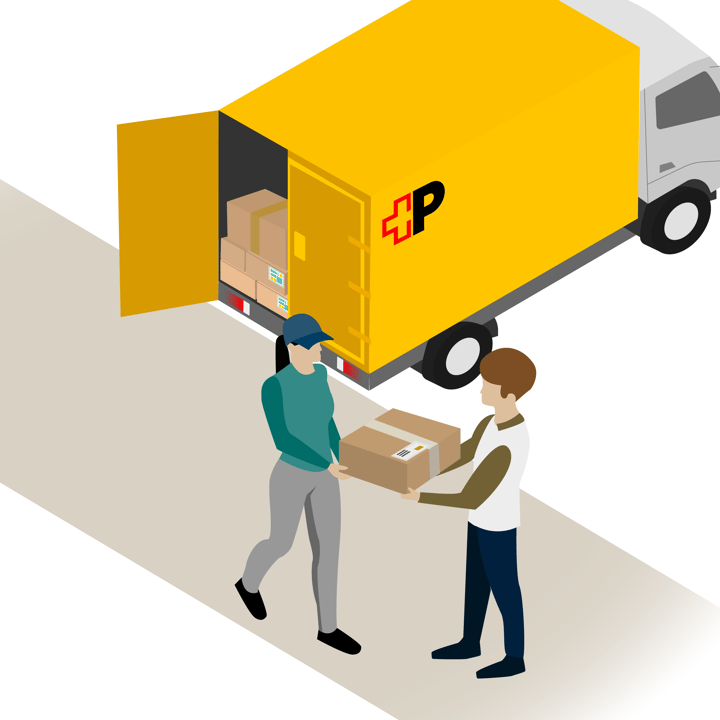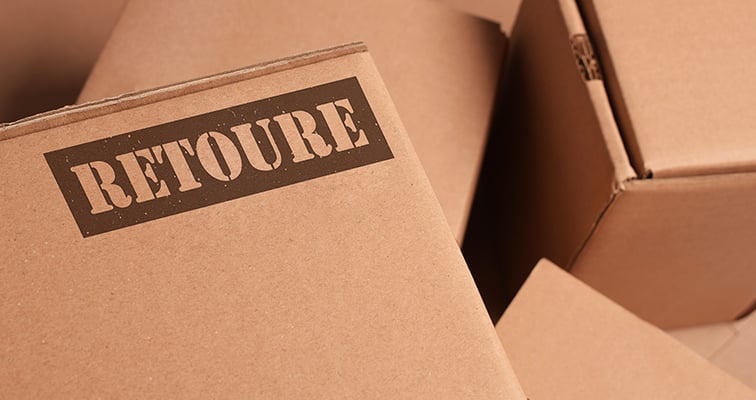- Resources
- Lowering the return rate
E-Commerce return rate in Switzerland – how to reduce it

How is the return rate calculated at all?
Do you know what the term "return rate" means? Very simple: it describes the number of returns in relation to the orders sent. So if you have sent out 100 orders and 30 come back, your return rate is 30%.
Return rate as profit killer
Unfortunately, the return rate is much higher in real life. The front-runner here is the fashion sector, where it is often 60%. So more than half of the orders are usually returned.
For smaller online shops, however, such a high return rate can become a real problem. After all, not only do the goods have to be returned, but they also have to be unpacked, checked and booked back into the warehouse. An immense effort!
Complicated return handling in e-commerce results in order cancellation
However, it is important for the customers that the returns are included in the price. According to the Shopper Survey Study of IPC (2023), an important reason for cancelling an order is if the return option is complicated and subject to a charge. Today's customers definitely don't want that anymore.
What are we going to do with this knowledge? We have a conflict of goals here: On the one hand, the conversion rate should be as high as possible. But on the other hand, this cannot be achieved without a simple return option.
Have a look at the return solution of Swiss Post. It makes it easy for your customers: They can simply return the item via business reply mail at any post office.
It's also easy for you as an online retailer: With the returns solution from Swiss Post you can conveniently handle the Content Check, the returns are consolidated and returned to you cost-efficiently. All very simple and convenient.
In order to reduce the return rate, we have a few efficient tips in store. Just read on.

A detailed product description reduces returns
If your products are described in detail and truthfully, this has an effect on your return rate. But what does "detailed" and "truthful" mean? Here are some inputs:
- Avoid technical terms
- Choose a simple language
- Stick to the truth and be transparent
- Choose strong adjectives
- Create a picture in your customer's mind
We'll give you an example: When you invent extraordinary, super creative color names, you'll boost your return rate. Few people can imagine an exact colour under "dove". So it's better to write "light grey".
Or even better: you write both! Because in this case, it fires up the search algorithms, and you increase the chance that your products will be found.
Use testimonials for your products
Testimonials or product reviews from other customers are also great. These can be used specifically to reduce the return rate. Testimonials from other buyers are popular and give your customers an even better picture of your products.
In Germany, online reviews are one of the most important decision-making aids – more than half of online shoppers read reviews before deciding on a product (source: Bitkom, 2020). Take advantage of this fact!
Professional product images have an influence on the return rate
In contrast to the analogue shopping experience, it is crucial for an online shop that the products are presented in a genuine and professional manner.
In the ideal case, the product is not just displayed with a single image, but from different angles (360 degrees). It is also worthwhile to show the product size true to the original. A discreet reference object is very well suited for this purpose.
Even more unusual: With the help of augmented reality, buyers can judge the products even better. They make fewer false purchases and you minimize your returns.
Higher conversion rate? Sure! With product videos!
With product videos you can even go one step further. This investment can certainly pay off. Videos increase the conversion rate because they strengthen brand awareness, generate attention and last but not least, they increase the organic traffic of your online shop.
Product samples help against returns in e-commerce
Free samples are also a good way of combating returns in e-commerce. Your customer can order a free sample and then decide for or against the product. A practical example: For jewellery, customers can order a size template in advance so that they can then order the correct ring size and avoid unnecessary returns.
Important for fashion retailers: a size chart as accurate as possible
In the clothing industry, correct measurements and size information are absolutely essential. This point is even more important if you sell your goods abroad. International size tables and also product pictures with the size information of the models can reduce the return rate. Because if your customers receive the ordered clothes in the wrong size, they will be frustrated. And: The goods are returned to you.
Help your customers
You know your products inside out. Use this knowledge! With Chatbots you can have frequently asked questions answered easily and conveniently. Many shop software offers the chatbot by default or via plug-in. A great technology for your online shop – use it!
The assistance is not only important before the purchase. Especially for technical products a telephone helpline is a great solution. For your customers and for your return rate! You can also use this tool to obtain a product evaluation.
Product comparisons create trust
A product comparison can give your customers the best possible advice. This is especially true for technical products or those in the fashion sector. This way you help your customers to choose the best product for their needs. You also gain their trust. And, once again: you lower the return rate in your online business.
Optimized packaging reduces return rate
According to a study by the Cologne Institute for Trade Research, 40% of returns are due to damaged goods. So there is great potential! If you pack the shipments correctly and carefully, you effectively reduce the damage rate and thus the number of returns.
Sustainability is important to the Swiss. You can find out which environmentally friendly packaging alternatives you can use in our blog article.
Rely on a reliable shipping partner for your goods
Imagine this scenario: This weekend, THE party's on and you want to blow everyone away with your awesome outfit. But it's already Friday and there's no sign of the package. First of all you are annoyed. And secondly, you're going to return the order that arrives the Monday after the party.
What happened? Even though you sent the order on time, it was not enough. It was the shipping partner's fault. That's why cunning e-commerce professionals have known for a long time: a reliable shipping partner is one of the reasons why their online shop runs smoothly.
Ready for the next step? Arrange your consultation appointment now and let us find the optimum solution for your logistics setup.
Precise delivery times have an effect on your online shop return rate
If customers do not know exactly when their delivery will arrive, this also has an impact on returns in e-commerce. Delivery times of 7 to 30 working days are not very popular.
Depending on the shipping partner, however, it is not possible to give an exact delivery time. Nevertheless, you should have enough experience so use it specifically.
According to the IPC Shopper Survey, the most important thing for online shoppers is being able to estimate when delivery will arrive. Next day delivery is not expected in cross-border e-commerce. It is also too cost-intensive. However, it is important that you can inform your customers of an expected delivery date.
An example of delivery specifications that meet the needs of today's customers: Estimated delivery between Monday, 13 January and Tuesday, 14 January.
Tracking is a must for cross-border orders
In reality, the promised delivery time cannot always be kept, that's just the way it is. Especially in busy times such as before Christmas, no carrier can meet the standard delivery time. But if you give your customers the tracking number, they can always track the status of the shipment and estimate when it is expected to arrive.
This service is not just "nice to have", but a must in cross-border e-commerce! You must not save money here, because shipping with tracking is part of a professional online shop.
Pro tip
Inform your customers proactively about a possible delay. This way they are warned and disappointments can be avoided. And most importantly, provide them the tracking number of their order.
Pro tip
Inform your customers proactively about a possible delay. This way they are warned and disappointments can be avoided. And most importantly, provide them the tracking number of their order.
Choose the right Last Mile Delivery
On this point, countries differ culturally. If you send your goods to Italy, your Italian buyers will appreciate an SMS notification before delivery. In Spain, personal delivery is required, while in Scandinavia a click and collect system is preferred. So when you send your products abroad, you need to know the delivery preferences of the foreign market – this minimizes the number of returns in online commerce.
Hurdle: Pick up at the post office
Depending on the delivery service, the recipient must accept the goods against signature. If your shipment is sent by registered mail, the parcel must not simply be delivered to your letterbox. Please note: Depending on the destination country, it may be an obstacle for the recipient to pick up the goods at the post office. Adapt the shipping method to the recipient country. So that you do not annoy your foreign customers.
Specify total landed cost in check-out
Do you know what happens if you do not clearly declare in the check-out form that there may still be costs such as VAT or customs fees? In the worst case, your customers will only be handed over the goods against payment of the applicable fees.
You run the risk that they will reject the order and the shipment will be returned to you. Undeliverable shipments increase your return rate and your costs.
We show you how to avoid this scenario: For cross-border shipments, decide whether you want to send the goods by DAP or DDP. Abbreviations that we will gladly explain to you. In this blog post you will find everything you need to know about shipping Incoterms.
Describe and explain the selected Incoterm in the check-out form. This makes it clear to the buyer whether any fees are due and he will not be negatively surprised.
Attention: Some shipping partners will charge your customers for the resulting fees later. This is a procedure that rightly annoys your customers. And you again risk that they will return the originally accepted goods after all or they will never order again.
Reward customers with a low return rate
One thing is clear: simple return handling at the expense of the online shop can massively increase the conversion rate. If no return option or simple return handling is offered, the purchase is often abandoned – nobody buys a pig in a poke.
The question is: How can you motivate your customers to refrain from returning the goods?
Reward your customers! One way is to give them vouchers or discounts if they choose not to return the goods. In this way you increase the repurchase rate at the same time.
Pro tip
With the help of the return data obtained, you can evaluate exactly which customers have a low return rate. You can reward these customers with newsletters or vouchers.
Pro tip
With the help of the return data obtained, you can evaluate exactly which customers have a low return rate. You can reward these customers with newsletters or vouchers.
Payment method has an influence on the return rate
There are also cultural differences in payment methods and preferences vary from country to country. If, for example, in contrast to paying by invoice, you give discounts for advance or immediate payment by credit card, this will be reflected in your return rate.
This is because if the goods have already been paid for, the inhibition threshold is higher to return the shipment and lose the discount again. Try it out!

Evaluate reasons for returns
In the study by the Institute for Retail Research Cologne, it was found that only every second online shop inquires about the reason for returns. A pity! Because exactly this knowledge can help to avoid future returns.
If you know why the customers send the goods back, you can work against it. For example, by optimizing the product description.
For example, if the wrong size is always specified as the reason for returns, there is probably an error in the size table. So use this knowledge, analyze the reasons and draw the right conclusions.
The order is returned – and now what?
The handling of returns should not be underestimated. Often the return is connected with large costs.
But do not panic: We help you with many tips and tricks so that you can optimise your returns handling. Click here for more information: Optimise the returns process for Importing Goods to Switzerland.
In summary, how to lower your return rate
Finally, a short overview of what you should consider when handling returns:
- No hidden costs in check-out with the Total Landed Cost Calculator.
- Describe your products as detailed as possible - and honestly.
- Invest in professional pictures and videos.
- Offer assistance with questions via chatbot.
- Choose the optimal packaging!
- Keep your eyes open for the delivery partner and the shipping product!
- You know about the supply preferences of your markets.
- Accurate delivery times are essential.
- Reward system for customers with a low return rate.
- Take into account the influence of the payment type on the return rate.
- Ask why the product was returned. And then implement the findings.
Sources:
IPC Cross-Border E-Commerce Shopper Survey 2023
Bitkom Research 2019
IFH Köln 2020, Versand- und Retourenmanagement im E-Commerce
Individuelle Lösungen für einzigartige Bedürfnisse
Mit der persönlichen Beratung zum optimalen Versand- und Logistiksetup
Bei der Schweizerischen Post verstehen wir, dass jeder Markt seine eigenen, einzigartigen Herausforderungen hat. Deshalb sind wir hier, um Dich beim Export in die Schweiz oder beim Export aus der Schweiz zu unterstützen. Mit unserer umfassenden Erfahrung und unserem massgeschneiderten Ansatz finden wir gemeinsam die optimale Lösung für Dein Versand- und Logistik-Setup.
Warum einen Beratungstermin bei uns buchen?
-
Massgeschneiderte Lösungen
-
Umfassende Expertise
-
Einfacher Prozess
-
Vertrauenswürdiger Partner
Customised solutions for unique needs
Personalised advice for the optimal shipping and logistics setup
At Swiss Post, we understand that every market has its own unique challenges. That's why we're here to help you export to or from Switzerland. With our extensive experience and customised approach, together we will find the optimal solution for your shipping and logistics setup.
Why book a consultation with us?
- Customised solutions
- Comprehensive expertise
- Simple process
- Trusted partner
Des solutions personnalisées pour des besoins uniques
Un conseil personnalisé pour une configuration optimale de l'expédition et de la logistique
A la Poste Suisse, nous comprenons que chaque marché a ses propres défis uniques. C'est pourquoi nous sommes là pour vous aider à exporter vers la Suisse ou à exporter depuis la Suisse. Grâce à notre vaste expérience et à notre approche sur mesure, nous trouverons ensemble la solution optimale pour votre configuration d'expédition et de logistique.
Pourquoi réserver un rendez-vous de conseil avec nous ?
- Des solutions sur mesure
- Une expertise complète
- Processus simple
- Un partenaire de confiance
Soluzioni personalizzate per esigenze uniche
Consulenza personalizzata per l'impostazione ottimale della spedizione e della logistica
Noi della Posta Svizzera sappiamo che ogni mercato ha le sue sfide uniche. Ecco perché siamo qui per aiutarla ad esportare da o verso la Svizzera. Grazie alla nostra vasta esperienza e all'approccio personalizzato, insieme troveremo la soluzione ottimale per il suo setup di spedizione e logistica.
Perché prenotare una consulenza con noi?
- Soluzioni personalizzate
- Competenza completa
- Processo semplice
- Partner affidabile




